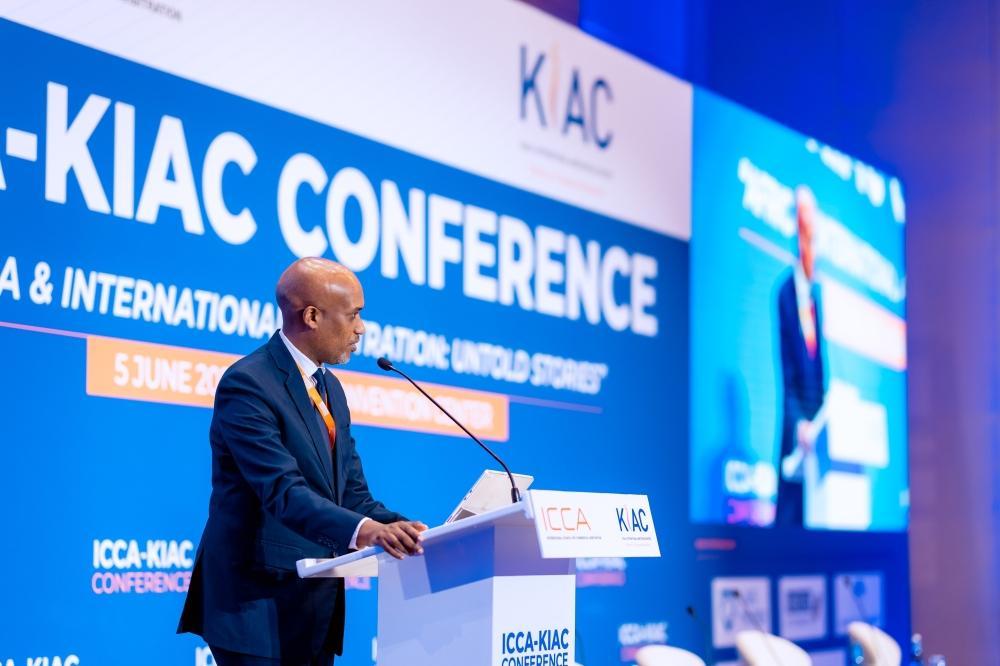Africa-Press – Rwanda. The Minister of Justice, Emmanuel Ugirashebuja, has called on legal practitioners, arbitration institutions, and businesses across Africa to embrace Artificial Intelligence (AI) as a transformative force in commercial arbitration for it could make procedures much faster and cost-efficient.
He said this during the International Council for Commercial Arbitration–Kigali International Arbitration Centre (ICCA-KIAC) conference, hosted in Kigali on June 5.
Members of the judiciary acknowledged that the emergence of AI is undeniable, especially as systems are increasingly designed to benefit everyone. They believe that no business can thrive while tangled up in court cases or unresolved disputes, which is why arbitration plays an important role.
Ugirashebuja told the delegates that the rise of AI provides unprecedented opportunities to “streamline arbitration procedures, making them faster, more efficient, and cost-effective.”
“I ask all of us to try and embrace AI where it will make procedures much faster and cost efficient,” he said.
The Minister outlined key AI-driven trends that are reshaping arbitration globally and increasingly gaining traction in African legal systems.
One of the major trends he highlighted is AI-powered case management. By automating document review, case analysis, and procedural tasks, AI can reduce the time and costs associated with dispute resolution.
“We’re living in the AI era and it has potential in transforming arbitration making disputes resolution potentially faster, more efficient and data-driven,” he noted.
Another trend, predictive analytics, allows AI to analyze past arbitration awards to forecast potential outcomes. This tool can help parties better assess risks and make informed decisions before initiating arbitration proceedings.
“There is a possibility that AI can assist parties to foresee outcomes, and this is something we are beginning to see in judiciaries across the world,” Ugirashebuja said.
The Minister noted that while AI is evolving, it is not likely to replace human arbitrators, at least in the near future. Instead, it can be used as a valuable assistant, helping in drafting awards, analyzing evidence, and ensuring consistency in rulings.
“There are discussions about AI-assisted arbitrators but I do believe that AI is unlikely to replace human arbitrators entirely. I don’t believe that we’re in the era where we’ll love AI arbitrators,” he said.
AI-driven Online Dispute Resolution (ODR) platforms are another advancement, the Minister explained. These tools allow for cross-border arbitration to take place, reducing logistical hurdles and making arbitration more accessible.
Delegates at a one-day conference co-organized by the International Council for Commercial Arbitration (ICCA) and Kigali International Arbitration Centre in Kigali on June 5. Courtesy
However, Ugirashebuja cautioned that the adoption of AI must be done responsibly. He pointed out ethical and legal challenges, such as bias, transparency, and accountability.
“Despite its benefits, AI in arbitration raises valid concerns. I commend institutions like Chartered Institute of Arbitrators for taking the lead in developing guidelines for responsible AI use,” he said.
Rwanda as a model for arbitration in Africa
Chief Justice Domitilla Mukantaganzwa said that Rwanda has taken deliberate reforms to make arbitration a credible and integral part of its justice system. She pointed to the Kigali International Arbitration Centre as a key institution in this journey.
“Rwanda has made deliberate efforts to embed arbitration in our justice system. Our judiciary supports arbitration, not as an alternative to justice, but as an appropriate component of it,” she noted.
Mukantaganzwa highlighted that across Africa, countries are modernizing legal infrastructure and reforming arbitration laws to build investor-friendly and credible mechanisms for commercial justice.
“These reforms are not only legislative exercises; they are bold steps towards African ownership of arbitration as a legitimate and more trusted means for commercial justice,” she added.
For More News And Analysis About Rwanda Follow Africa-Press






